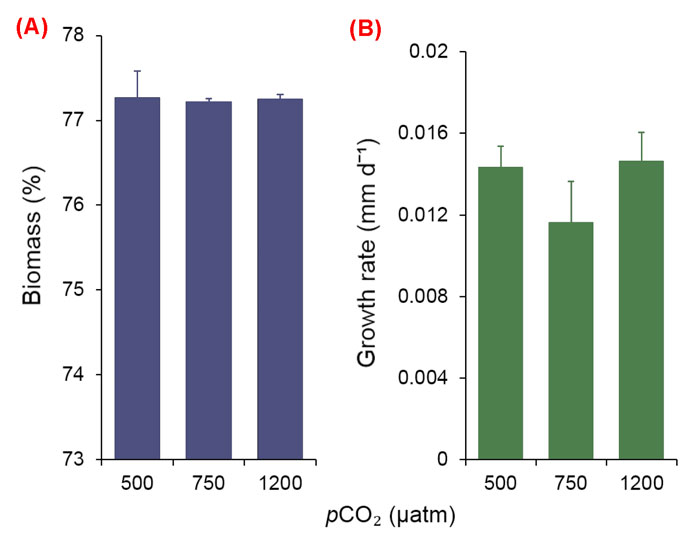| Tweet | Follow @co2science |
Paper Reviewed
Benítez, S., Lagos, N.A., Osores, S., Opitz, T., Duarte, C., Navarro, J.M. and Lardies, M.A. 2018. High pCO2 levels affect metabolic rate, but not feeding behavior and fitness, of farmed giant mussel Choromytilus chorus. Aquaculture Environment Interactions 10: 267-278.
Choromytilus chorus is a giant mussel species that inhabits subtidal and intertidal locations off the coast of southern Chile. In recent years, it has grown in economic importance as a commercial species, where annual production has increased from 339 tons of biomass in 2012 to 2090 tons in 2014. Yet, little is known about how this species might respond to predicted future changes in so-called ocean acidification.
Seeking some answers in this regard, Benítez et al. (2018) exposed juvenile C. chorus specimens in a laboratory setting to three pCO2 treatment conditions (500, 750 or 1200 µatm) over a period of 30 days to evaluate its physiological response to ocean acidification.
Results indicated that under elevated pCO2 conditions C. chorus juveniles experienced increased metabolic rates. However, other physiological traits remained unaffected, including clearance and ingestion rates, ammonia excretion, adsorption efficiency, growth rates, biomass production, net calcification, and net dissolution rates. What is more, no juveniles experienced mortality in any of the three pCO2 treatments.
Commenting on these findings, Benítez et al. write that "similar results have been reported in other studies of bivalves from estuarine and upwelling zones (e.g. Duarte et al., 2014; Lagos et al., 2106; Lardies et al., 2017) and also in other mussel species that appear resilient to elevated pCO2 (e.g. Thomsen and Melzner, 2010; Mackenzie et al., 2014; Clements et al., 2018)." And in reasoning why such non-impacts have been found, they opine that "one possible explanation for this tolerance is that C. chorus inhabits a wide range of environmental conditions (e.g. estuaries and the marine environment), involving variable carbonate availability (see Melzner et al., 2013; Vargas et al., 2017) and thus has acclimatized to overcome the negative effects of high pCO2 conditions."
Whatever the case may be, we find herein yet another study that shows so-called ocean acidification to be a non-problem to aquatic life.

Figure 1. Biomass (Panel A) and growth rates (Panel B) of the mussel Choromytilus chorus exposed to contrasting pCO2 levels. Bars correspond to means ± 1 SE. Source: Adapted from Benítez et al. (2018).
References
Clements, J.C., Hicks, C., Tremblay, R. and Comeau, L.A. 2018. Elevated seawater temperature, not pCO2, negatively affects post-spawning adult mussels (Mytilus edulis) under food limitation. Conservation Physiology 6: cox078.
Duarte, C., Navarro, J.M., Acuña, K., Torres, R., Manriquez, P.H., Lardies, M.A., Vargas, C.A. et al. 2014. Combined effects of temperature and ocean acidification on the juvenile individuals of the mussel Mytilius chilensis. Journal of Sea Research 85: 308-314.
Lagos, N.A., Benítez, S., Duarte, C., Lardies, M.A., Broitman, B.R., Tapia, C.S.M., Tapia, P.N.G., Widdicombe, S. and Vargas, C.A.T. 2016. Effects of temperature and ocean acidification on shell characteristics of Argopecten purpuratus: implications for scallop aquaculture in an upwelling-influenced area. Aquaculture Environment Interactions 8: 357-370.
Lardies, M.A., Benítez, S., Osores, S., Vargas, C.A., Duarte, C., Lohrmann, K.B. and Lagos, N.A. 2017. Physiological and histo-pathological impacts of increased carbon dioxide and temperature on the scallops Argopecten purpuratus cultured under upwelling influences in northern Chile. Aquaculture 479: 455?466.
Mackenzie, C.L., Ormondroyd, G.A., Curling, S.F., Ball, R.J., Whitely, N.M. and Malham, S.K. 2014. Ocean warming, more than acidification, reduces shell strength in a commercial shellfish species during food limitation. PLOS ONE 9: e86764.
Melzner, F., Thomsen, J., Koeve, W., Oschlies, A., Gutowska, M.A., Bange, H.W., Hansen, H.P. and Körtzinger, A. 2013. Future ocean acidification will be amplified by hypoxia in coastal habitats. Marine Biology 160: 1875-1888.
Thomsen, J. and Melzner, F. 2010. Moderate seawater acidification does not elicit long-term metabolic depression in the blue mussel Mytilus edulis. Marine Biology 157: 2667-2676.
Vargas, C.A., Lagos, N.A., Lardies, M.A., Duarte, C., Manríquez, P.H., Aguilera, V.M., Broitman, B., Widdicombe, S. and Dupont, S. 2017. Species-specific responses to ocean acidification should account for local adaptation and adaptive plasticity. Nature Ecology & Evolution 1: 0084.
Posted 26 August 2019



